Natural environment
Healthy Choice pharmacies from
which PGF collects drugs for disposal
476.73 tonnes
of cardboard and paper
recovered for recycling
21 mln km
travelled on business related
to cooperation with all
Pharmalink’s trade partners
collected
bottle caps
Due to the nature of its business, Pelion’s environmental impact is negligible. However, taking a responsible approach to business and environment protection, the Company also focuses on aspects on which it has little impact, including waste management, energy, water and paper consumption as well as transport.
Pelion S.A.’s environmental impact is specified in its environmental policy adopted in 2012, which requires all Pelion Group companies and their employees to comply with environmental protection laws and encourages them to implement individual and proprietary projects in this area. As a Global Compact member, Pelion adopted, and committed all Pelion Group companies to adopt and follow, the UN guidelines in this area. Its key environmental policy objectives involve a precautionary approach to the natural environment, initiatives to promote environmental responsibility, as well as use and promotion of environmentally friendly technologies. Environmental issues were also addressed in Pelion’s Code of Ethics approved in 2013, which requires employees to:
- ensure efficient management of energy, water, paper and other consumables used at their workplace,
- actively seek new ways to optimise logistics processes and organisational solutions to improve the efficiency of energy and raw materials used and reduce the amount and nuisance of generated waste and pollutants,
- segregate waste at the workplace and take part in recycling collections,
- use the corporate car fleet economically, using ecodriving techniques.
Employees are required to promptly notify their superiors of any identified or potential threats to the environment and any instances of non-compliance with environmental protection regulations.
The Company identified its direct and indirect environmental impacts and accounted for them in its CSR strategy.
Direct environmental aspects, which can be controlled by changing everyday behaviours at every stage of our operations:
- energy consumption, related to heating, lighting, and use of computers, printers and telephones in day-to-day work, as well as household appliances,
- withdrawal and consumption of water,
- consumption of paper attributable to contracts, settlements, orders and invoices,
- consumption of fuels by the corporate car fleet,
- generation of municipal and business-related waste.
Indirect environmental aspects, which cannot be fully controlled by Pelion, include:
- Pelion’s relations with third parties, which it can influence only to a limited extent,
- legal regulations and administrative decisions,
- cooperation with various providers of maintenance, waste collection, transport, cleaning and other services.
Compliance
In 2015, no financial fines or non-financial sanctions for non-compliance with environmental protection regulations were imposed on Pelion. Similarly, no incidents with an adverse environmental impact were recorded.
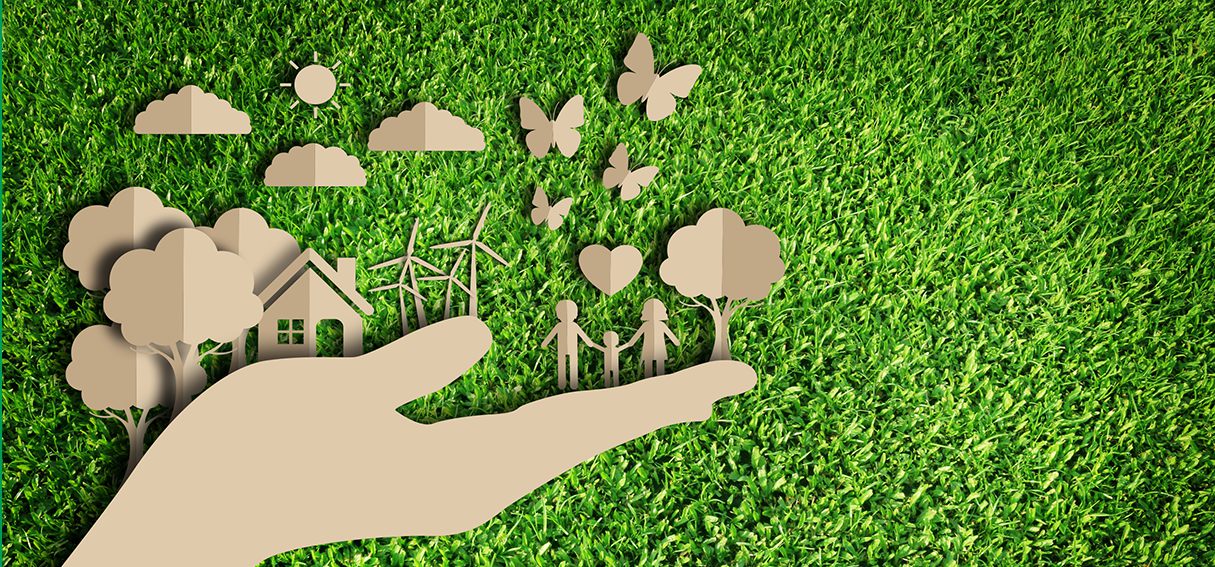
Eco-friendly initiatives
As part of its Eco Project, Pelion takes initiatives aimed at ensuring:
- compliance with environmental laws and other similar requirements applicable to the Company’s operations,
- mitigation of its adverse environmental impacts through sustainable consumption of electricity, heat, and natural resources, paper in particular,
- sustainable and environmentally safe waste management through sorting, setting aside and transfer of waste for recycling or disposal,
- promotion of sustainable attitudes and environmentally friendly conduct among employees and stakeholders,
- continuous improvement of industrial processes and implementation of new technical and organisational solutions to reduce adverse environmental impacts.
The Eco Project involves the work of the Eco Team, consisting of employees of different Pelion Group companies, whose task is to promote environmentally friendly solutions. Members of the team organise environmental awareness projects all year round, encouraging all employees to ‘go green’. Their achievements include the preparation of an ecodriving manual, available to all employees. Advice on pro-environmental behaviours is posted on the electronic notice board and published in Company magazines. The team initiates and executes most of the Company’s environmental protection projects, such as the collection of waste paper, spent toner cartridges, batteries, and bottle caps. The initiative is supported by the Dbam o Zdrowie Foundation, which helps organise relevant campaigns.
‘Medication for Toners’ - a project which combines environmental protection with community engagement, and integrates employees around shared CSR objectives. Employees of our companies collect spent toner cartridges, which are then handed over as dangerous waste to a licensed collection and disposal operator. The proceeds are credited to the account of the Dbam o Zdrowie Foundation, providing additional support to those under its care.
Waste paper collection – the initiative is supported by Pharmapoint and the Dbam o Zdrowie Foundation. Waste paper can be deposited in a special container all year round. Funds from the sale of waste paper are also transferred to the Dbam o Zdrowie Foundation.
‘Caps to bags’ - the goal of the campaign is to support local communities partnering with the Dbam o Zdrowie Foundation. In Łódź, the collected caps are transferred to the Children’s Hospice in Łódź and the Single Mother Shelter. In Gdańsk, the initiative’s partner is the Hospice Foundation. In 2015, 184.4 kg of bottle caps were collected by employees and handed over to the beneficiary institutions.
Waste management
All types of waste, including hazardous waste, are collected at all Pelion Group companies under agreements with licensed waste collection companies. Unneeded and outdated documents are also handed over for safe disposal to licensed companies, which recycle and reuse the recovered material. Every employee tries to use office materials at their workplace as much as possible (reuse of binders, envelopes, folders, etc.).
In 2015, steps were taken to implement an integrated waste management system at Natura beauty stores. Customers can leave their used electric and electronic items at the store when buying equipment of the same type, and dispose of used batteries into a generally available designated container. At every retail outlet a poster is displayed with information on selective waste collection together with the addresses of the nearest locations where it can be disposed of.
Generated waste – plastic [Mg]

Generated waste – paper and cardboard [Mg]

* In 2015, the scope of reported data was broadened compared with 2014. The reported data covers all Polish companies operating in three business lines, including Natura beauty stores.
Medicinal products management
A special type of waste is medical waste, including expired drugs, which is hazardous. Such products cannot be thrown out with domestic refuse or left at dumps because they decompose into the ground, posing a threat to people and animals. That is why it is so important to ensure that the supply chain provides for safe disposal of recalled and expired drugs by licensed companies.
All wholesale companies carry out detailed monitoring of their stocks checking their expiry dates and looking for damaged packaging. Products expiring in six months or less are checked for the possibility of their return to the supplier, exchange or sale. In addition, every month all items are checked for expiry and damage in order to make sure whether some of them need not be returned to the supplier, exchanged or disposed of.
The procedure of handling damaged, expired or soon to be expired drugs is specified in an internal instruction. Wholesalers dispose of drugs in accordance with the Quality System Instruction related to product disposal.
Products to be disposed of are classified as waste and are subject to the Act on Waste (Dz.U. of 2013 No. O item 21). All types of waste, including expired drugs, are subject to selective waste collection in accordance with the Regulation of the Ministry of the Environment of December 9th 2014 on a catalogue of waste (Dz.U. of 2014, item 1923). Waste is transferred for disposal at least once a year only to licensed companies, with which Pelion Group companies have executed relevant agreements.
These entities hold authorisations granted by the relevant body for carrying out activities consisting in transport, collection or disposal of waste and are classified as service providers to the wholesalers in accordance with the applicable internal procedure.
The wholesalers record the quantity and quality of waste in accordance with the catalogue of waste and a list of hazardous waste types (Dz.U. of 2014, item 1973).
To manage drug expiry dates and ensure minimum damage to drugs, with due regard for proper waste management, the Company consistently improves the drug handling process thanks to:
- state-of-the-art logistics solutions to minimise the risk of impairment or loss of quality of the medicinal products (including a fleet of dedicated temperature-controlled vehicles for cold chain transport of drugs),
- strict medicinal product expiry date management,
- use of non-disposable packaging,
- new warehouse projects designed for energy efficiency,
- cutting-edge electronic systems for pharmacy order processing,
- sustainable management of non-disposable isothermal packaging,
- state-of-the-art sorting and picking lines to ensure faster order preparation for dispatch, and thus optimise transport processes,
- efficient use of cooling space.
As part of its cooperation with pharmacies, PGF supports their operations and helps collect drugs for disposal. Under relevant agreements, expired drugs are collected from pharmacies by a company specialising in drug disposal. This option is available to all pharmacies that have joined the Healthy Choice programme. In 2015, 740 private pharmacies opted for such collection services.
Generated waste – medical products, including cosmetics and samples [Mg]

* In 2015, the scope of reported data was broadened compared with 2014. The reported data covers all Polish companies operating in three business lines, including Natura beauty stores and DOZ Apteki Dbam o Zdrowie pharmacies.
When launching new proprietary brands, the Company takes care of the environment, for instance by selecting appropriate packaging to ensure minimal impact on the environment. The packaging of DOZ Products is made of cardboard and is biodegradable. DOZ Zielnik products are also sold in bags made of a fully biodegradable material.
Reduction of paper use and fostering environmental awareness
Employees try to reduce paper use in their day-to-day work, for example by double-sided printing. They are reminded to do so by special stickers placed near printers. New equipment to be purchased is selected based on whether it enables double-sided printing. E-mail footers encourage recipients to refrain from printing documents unless necessary. Offers and presentations, as well as newsletters (such as the newsletter of the Dbam o Zdrowie Foundation, the PULS and Pelion Wellness programme newsletters) are distributed by e-mail, including a notice that to protect the environment they should not be printed unless necessary. We constantly implement modern solutions to minimise paper use, including:
- newsletters and commercial offers in electronic form,
- e-learning,
- promotion of the use of electronic media for document distribution,
- workflow system – accounting for leaves, business trips and statements on social insurance contributions without hard copies,
- electronic Christmas and Easter cards and invitations,
- information in magazines encouraging readers to sort waste paper.
To ensure greater control of paper use, its procurement has been centralised. Every year this solution is applied by more companies.
Consumption of paper (in reams)*

* In 2013, data covered 20 companies, in 2014: 25 companies, and in 2015: 27 companies.
Energy consumption
Pelion consistently strives to reduce electricity consumption at its facilities. Already at the stage of procurement and selection, it focuses strongly on the environmental aspects to ensure that purchased equipment is energy efficient. Light sources are gradually replaced with more efficient ones. Both at renovated and new buildings, motion detectors and automatic light switches are installed. The investment project department and the Group’s building manager ensure that thermal efficiency of buildings is taken into account at the stage of their design or renovation. In new office and storage buildings, advanced and efficient heating, ventilation and cooling systems are used.
The Company also educates its employees on energy saving by placing relevant advice in the magazine for employees and on the electronic notice board.
Total consumption of energy from non-renewable sources (GJ) Companies based in Poland and Lithuania
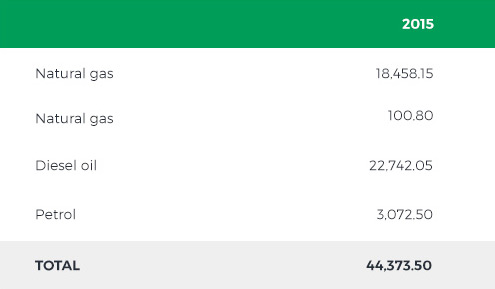
Total energy consumption: electricity and heat [KWh] Companies based in Poland and Lithuania
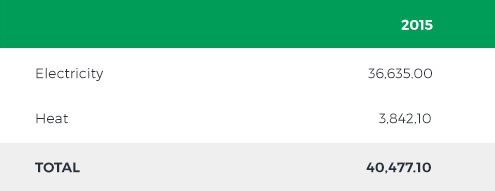
Water
Constant control and monitoring of water consumption enable its rational use. Faucet aerators and dual-flush toilets are installed. Stickers next to washbasins and sinks encourage employees to save water.
Total water consumption [m3]
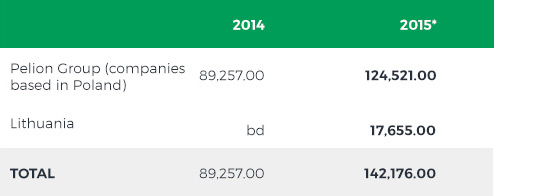
* In 2015, the scope of reported data was broadened compared with 2014. The reported data covers the companies operating in three business lines, including Natura beauty stores and DOZ Apteki Dbam o Zdrowie pharmacies, as well as Lithuanian companies.
Higher water consumption compared with 2014 was also due to repair and construction work performed, including renovation of the fire water storage tank in Poznań (sealing of the shell, discharge of water and refilling of the tank) and construction of a new facility in Łódź (in 2015, additional 10,000 m2 of storage area was built and headcount at the new storage facility rose significantly).
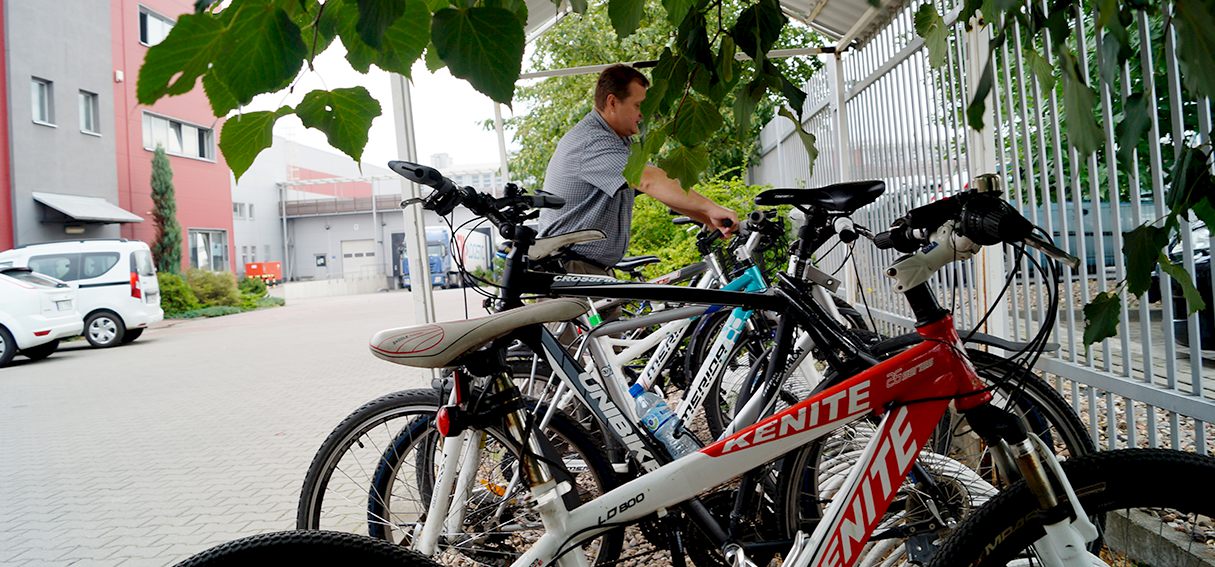
Transport
The Company encourages its employees to protect the environment by reducing fuel consumption.
The Company promotes:
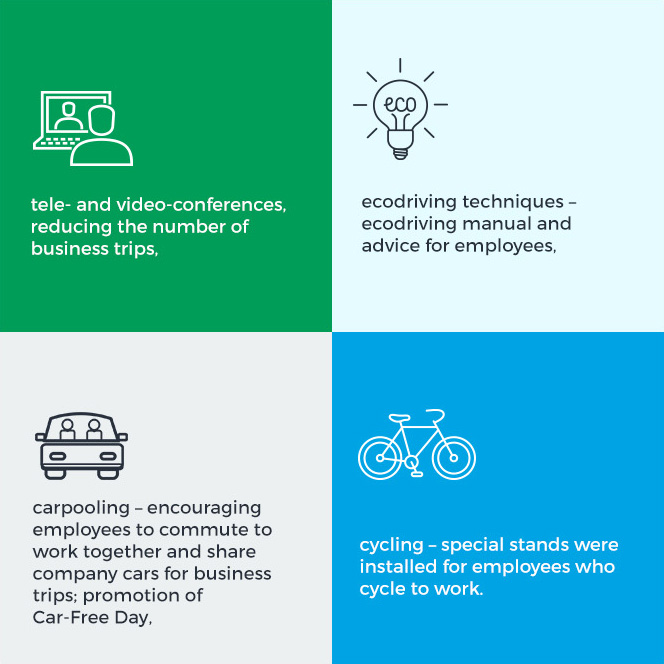

Fuel consumption (company cars)*

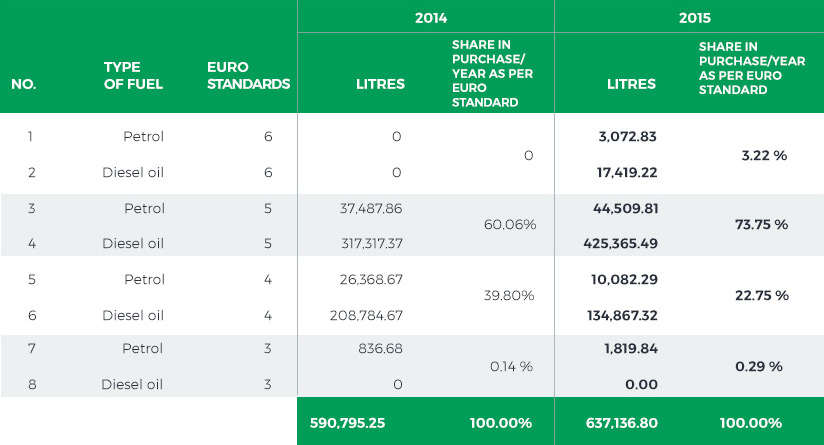
*Based on fuel cards.
The Company continues its policy to eliminate vehicles meeting the lowest EURO emission standard from its fleet. New cars have exhaust systems fitted with advanced catalysts, which reduce exhaust emissions. In 2015, the Company expanded its fleet to include vehicles meeting the highest EURO 6 standard. The share of fuels used by vehicles complying with the EURO 3 and EURO 4 standard declines year by year, with a concurrent increase in the amount of fuels used by vehicles meeting the EURO 5 standard, which was as high as 73.75% in 2015. Concurrently, consumption of diesel oil rises year by year at the expense of petrol. In 2015, petrol and diesel oil consumption was 9.34% and 90.66%, respectively. In 2015, a slight increase in fuel consumption was observed, resulting from business growth and a higher number of company cars.
Services related to Pelion’s corporate car fleet are provided by its subsidiary Pharmauto. The presented data was compiled based on fuel cards. Invoices for purchased fuel are not taken into account due to difficulties in gathering relevant data.
Logistics services, including in the area of warehousing and distribution, are provided to Pelion Group companies by Pharmalink Sp. z o.o. The subsidiary also provides its services to external customers. It cooperates with transport companies operating specialised and fully adapted vehicle fleets, compliant with applicable laws and Good Distribution Practice. GPS monitoring of vehicles used for transport is carried out on a 24/7 basis. Deliveries are made in accordance with the following distribution model: a standard delivery in 24 hours, 98 routes, direct deliveries within 12 hours and emergency deliveries. The temperature department supporting the entire distribution chain is responsible for vehicle validation, monitoring of the technical condition of vehicles and equipment to the extent it relates to transport conditions, alerts on exceeding limits, recorder supervision. The subsidiary cooperates only with transport companies whose vehicles (buses, lorries and trucks) are not older than five years. In 2015, a total distance travelled was 21,663,528 km. In order to minimise the negative impact on the environment, the Company optimises routes and focuses on maximum use of vehicle loading capacity (combining transports to eliminate travelling without loads, etc.).
[UNGC: 7,8,9]
All commitments for 2015 have been fulfilled. Pelion had committed to:
- continue the work of the Eco-Team,
- continue the ‘Caps to bags’ campaign, the ‘Medication for Toners’ project and waste paper collection for the benefit of the Dbam o Zdrowie Foundation.

Created by John Pitcher